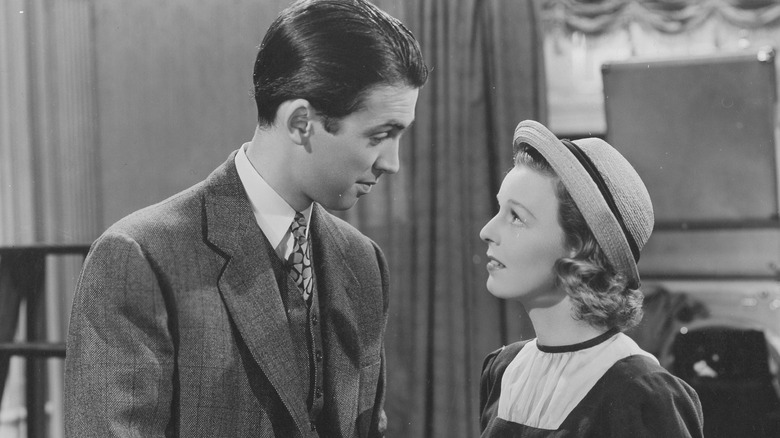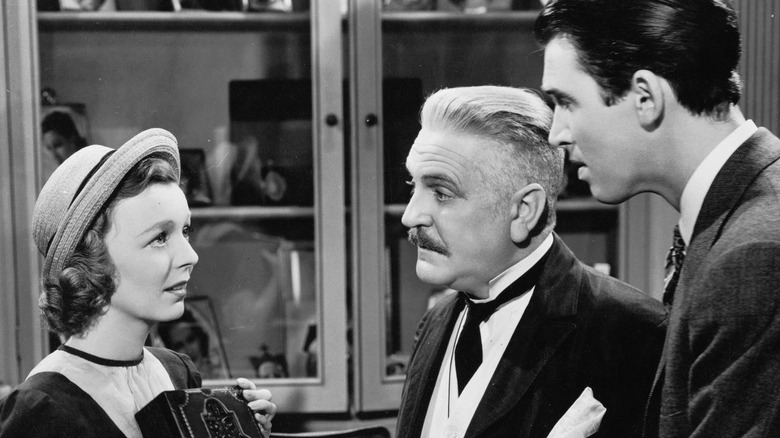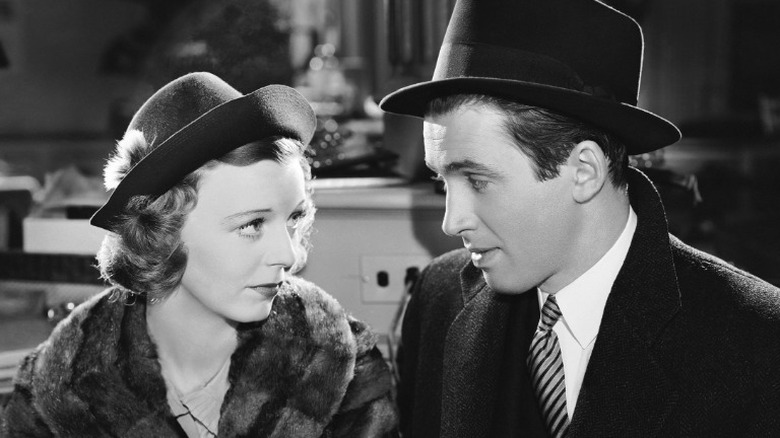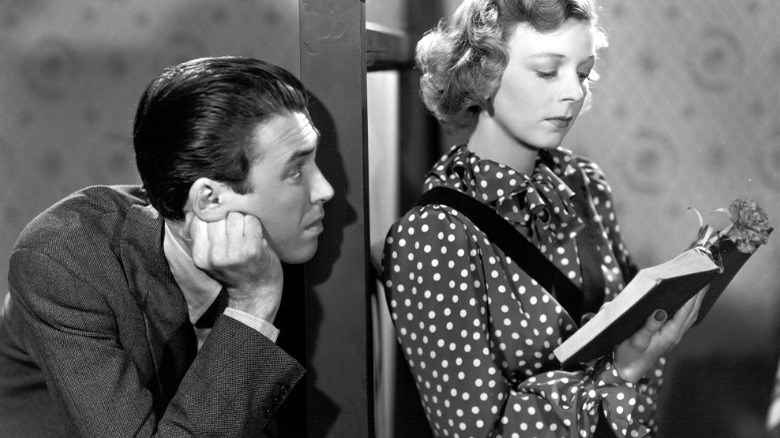The Shop Around The Corner Gave James Stewart One Of The Most Frustrating Scenes Of His Career
Ernst Lubitsch's 1940 Christmas comedy "The Shop Around The Corner" has a bit of everything: petty workplace drama, an affair, and a most unlikely romance, making for a combination that is both sweet and acidic at once. Everything in it is graced with the so-called "Lubitsch touch," a precise set of innuendo and body language that turns funny or sentimental material into something far greater, and the warmth and melancholy of the holiday only heighten that complex feeling. It also is probably the second-best James Stewart-led Christmas movie, just beneath "It's a Wonderful Life."
While "Shop" would sadly be the only Lubitsch movie with James Stewart playing the lead, the actor's typical affability and relaxed posture made him a natural fit for Lubitsch's sensibilities. Few of the director's other leading men, whether they were Gary Cooper or Don Ameche, could match what Stewart could suggest with a raised eyebrow. And Lubitsch's regular screenwriter Samson Raphaelson wrote dialogue perfectly suited to Stewart's cadence.
Because of all that, one would probably think that the production was easygoing. But there were difficulties, in the director's typical perfectionism but most significantly between Stewart and the actress playing his love interest, Margaret Sullavan. She and Stewart had been in films together before and had developed a personal relationship, and her spunk and wit charmed her to Lubitsch immediately. But one scene they shared would frustrate Stewart endlessly: a small but significant exchange between the two in a restaurant.
Matuschek and Company
"The Shop Around The Corner" represents Ernst Lubitsch at his most refined. The director, so skilled at depicting the subtlety and humor of high society, would now use his talents to tell the story of love in a simple shop in Budapest. As always with Lubitsch, the accents are a mix of everything from the German tones of Felix Bressart to Margaret Sullavan's studied theatricality. There's no attempt to make the movie's world more authentically Hungarian, but you believe it anyway.
The shop of the title is Matuschek and Company, and while the movie is full of incidents among the employees, it sparkles the most when digging into the chemistry between Kralik (James Stewart) and Klara (Sullavan). They bicker endlessly while working. In their off time they each have a secretive pen pal they've never met but long for romantically. Those pen pals end up being each other, meaning they're deeply in love with the coworker they think they hate.
If that sounds a bit like the '90s time capsule "You've Got Mail," that's because that movie was adapted from "Shop Around the Corner," trading the P.O. Box notes of "Shop" for the early days of email. And while Tom Hanks and Meg Ryan make for a wonderfully endearing couple, there's just something about the way Stewart and Sullavan play their characters' romance that cannot be matched. Some of that has to do with the honesty of the tension between them, which wasn't far off from real-life arguments behind the scenes.
Stewart and Sullavan
James Stewart and Margaret Sullavan had a working relationship going back decades. Besides the two movies in which they starred in the 1930s ("Next Time We Love" from '36 and "The Shopworn Angel" from '38), they also worked together in the 1920s. In a theater troupe known as the University Players, Stewart and Sullavan (along with Stewart's good friend and Sullavan's eventual, two-year husband Henry Fonda) developed their skills and gained the confidence to pursue professional acting.
With that in mind, Stewart relished any chance he got to work with Sullavan. "He knew her moods," claimed Roy Pickard in his biography on Stewart, "understood her temperament and could handle any sudden emotional crisis that might occur on set." Most of those crises are alleged to have been a result of Sullavan's pickiness — her notoriously exacting nature as a performer. She expected the best from herself, and from others. Stewart, on the other hand, had a laid-back naturalism that made it look like he was doing nothing even in Alfred Hitchcock thrillers.
The friction between these lead actors gave the romance of "Shop" a great spark, but when it came down to one key scene, the moment in which Kralik realizes Klara is his pen pal, Stewart continually was failing to get his dialogue just right. Despite director Ernst Lubitsch's deceptively simple style, the interplay between the two needed to be played precisely. Sullavan was capable of getting it right every time, but Stewart struggled with the line, resulting in the most takes of any scene in his whole career.
Rolling up the trousers
At this point in the movie, Kralik has been let go from the shop, due to his boss Matuschek (Frank Morgan) suspecting him of having had an affair with Mrs. Matuschek. In reality, Kralik is strictly in love with his pen pal, whom he has never met. Kralik is feeling low, hardly worthy of love, when he and co-worker Pirovitch (Felix Bressart) walk past the restaurant where he is set to finally meet his "dear friend." Who turns out to be Klara.
It's one of Ernst Lubitsch's funniest and most magical scenes, with the camera held back in a medium-wide shot for long stretches just to watch the two characters feel each other out. Kralik can hardly believe the woman he's fallen in love with is the co-worker he so often got into petty arguments with. So he plays around with her, letting her insult him (by calling his intellect "a cigarette lighter that doesn't work") but taking offense when she calls him "bowlegged."
As James Stewart biographer Roy Pickard claimed, this was where the actor would get tripped up. He was meant to say he would roll his trousers up on the street to prove her wrong, and for some reason, the actor remembered, he "couldn't say it." Between Lubitsch's precise direction and Margaret Sullavan's steely gaze and penchant for outbursts, the pressure might have gotten to Stewart. It would require 48 takes, the most Stewart ever needed to get through a scene.
Watching the scene now, the frustration fades away. It has the typical Lubitsch ease and confidence, with Stewart and Sullavan both operating at their very best. In fact, it's one of Stewart's best movie moments.



